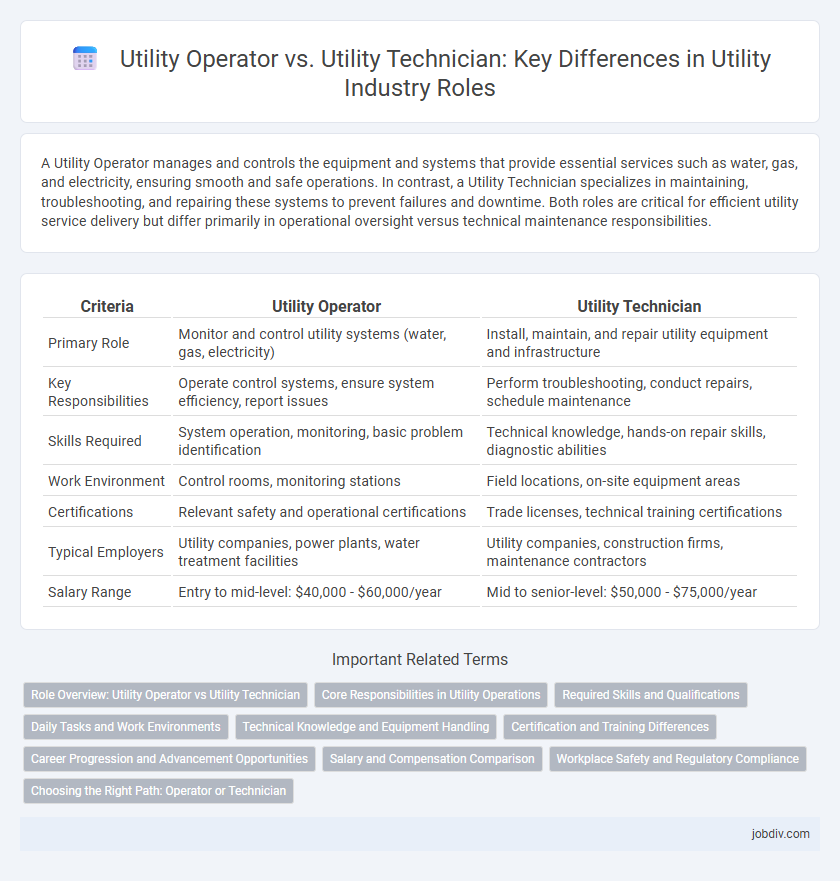A Utility Operator manages and controls the equipment and systems that provide essential services such as water, gas, and electricity, ensuring smooth and safe operations. In contrast, a Utility Technician specializes in maintaining, troubleshooting, and repairing these systems to prevent failures and downtime. Both roles are critical for efficient utility service delivery but differ primarily in operational oversight versus technical maintenance responsibilities.
Table of Comparison
| Criteria | Utility Operator | Utility Technician |
|---|---|---|
| Primary Role | Monitor and control utility systems (water, gas, electricity) | Install, maintain, and repair utility equipment and infrastructure |
| Key Responsibilities | Operate control systems, ensure system efficiency, report issues | Perform troubleshooting, conduct repairs, schedule maintenance |
| Skills Required | System operation, monitoring, basic problem identification | Technical knowledge, hands-on repair skills, diagnostic abilities |
| Work Environment | Control rooms, monitoring stations | Field locations, on-site equipment areas |
| Certifications | Relevant safety and operational certifications | Trade licenses, technical training certifications |
| Typical Employers | Utility companies, power plants, water treatment facilities | Utility companies, construction firms, maintenance contractors |
| Salary Range | Entry to mid-level: $40,000 - $60,000/year | Mid to senior-level: $50,000 - $75,000/year |
Role Overview: Utility Operator vs Utility Technician
Utility Operators primarily manage and control the operation of equipment within utility plants, ensuring the continuous and efficient production of services such as water, electricity, or gas. Utility Technicians focus on the installation, maintenance, and repair of utility systems, utilizing technical skills to troubleshoot and resolve equipment issues. Both roles require a strong understanding of utility infrastructure but differ in their practical application and responsibilities on-site.
Core Responsibilities in Utility Operations
Utility Operators manage and control the distribution and flow of utilities such as electricity, water, or gas, ensuring consistent service and system stability. Utility Technicians perform maintenance, repairs, and installation of utility infrastructure, troubleshooting technical issues to support uninterrupted operations. Both roles are critical in utility operations, with Operators focusing on system oversight and Technicians on hands-on technical support.
Required Skills and Qualifications
Utility Operators require strong mechanical aptitude, knowledge of equipment operation, and the ability to monitor and adjust utility systems for optimal performance, often needing certifications like CDL or specific industry licenses. Utility Technicians must possess technical skills related to installation, maintenance, troubleshooting, and repair of electrical, water, or gas utility infrastructures, with qualifications including technical diplomas or specialized training programs. Both roles demand safety awareness, problem-solving abilities, and familiarity with regulatory compliance standards specific to the utility sector.
Daily Tasks and Work Environments
Utility Operators manage and monitor systems such as water, gas, and electricity to ensure continuous service, often working in control rooms or outdoor sites with heavy machinery. Utility Technicians perform hands-on maintenance, repairs, and installations, responding to system malfunctions in various environments, including underground utilities and remote locations. Both roles require adherence to safety protocols and involve regular inspections to maintain optimal infrastructure performance.
Technical Knowledge and Equipment Handling
Utility operators possess advanced technical knowledge of complex systems and equipment used in energy distribution, water treatment, and infrastructure maintenance, enabling them to monitor, control, and optimize utility operations. Utility technicians specialize in hands-on equipment handling, including installation, troubleshooting, calibration, and repair of mechanical and electrical components, ensuring system reliability and safety. Both roles require proficiency with industry-standard tools and diagnostic devices, but operators focus more on system-wide control, while technicians emphasize practical maintenance and technical problem-solving.
Certification and Training Differences
Utility operators typically require formal certifications such as OSHA safety training and specialized equipment operation licenses, emphasizing regulatory compliance and operational safety. Utility technicians undergo more extensive technical training, often including apprenticeships and certifications in electrical, mechanical, or instrumentation fields to handle complex system maintenance and troubleshooting. Certification requirements for technicians focus on hands-on skills and in-depth technical knowledge, while operators prioritize safe equipment operation and basic system oversight.
Career Progression and Advancement Opportunities
Utility operators typically focus on managing and controlling equipment and systems to maintain utility services, while utility technicians perform hands-on maintenance, repairs, and installations. Career progression for utility operators often leads to supervisory or control room management roles, whereas utility technicians may advance toward specialized technical positions or field leadership roles. Both career paths offer opportunities for advancement through certifications, experience, and additional technical training within the utility sector.
Salary and Compensation Comparison
Utility operators typically earn a median annual salary ranging from $45,000 to $65,000, reflecting their responsibility for overseeing system operations and ensuring compliance with regulations. Utility technicians often have a slightly lower median pay, around $40,000 to $60,000, attributed to their technical roles involving equipment maintenance and troubleshooting. Compensation packages for both positions may include benefits such as health insurance, retirement plans, and overtime pay, with variations depending on the employer and geographic location.
Workplace Safety and Regulatory Compliance
Utility operators and utility technicians play distinct but complementary roles in workplace safety and regulatory compliance within the utility sector. Utility operators monitor and control systems to ensure safe operation of equipment, adhering strictly to safety protocols and environmental regulations. Utility technicians perform maintenance, repair, and inspections, ensuring all installations meet industry standards and comply with OSHA, EPA, and local regulatory requirements.
Choosing the Right Path: Operator or Technician
Utility operators manage system controls and monitor infrastructure to ensure continuous service delivery, often requiring strong problem-solving skills and real-time decision-making abilities. Utility technicians specialize in installation, maintenance, and repair of equipment, demanding technical expertise and hands-on experience with tools and machinery. Choosing between these roles depends on whether one prefers operational oversight and system management or technical, hands-on tasks in utilities.
Utility Operator vs Utility Technician Infographic

 jobdiv.com
jobdiv.com